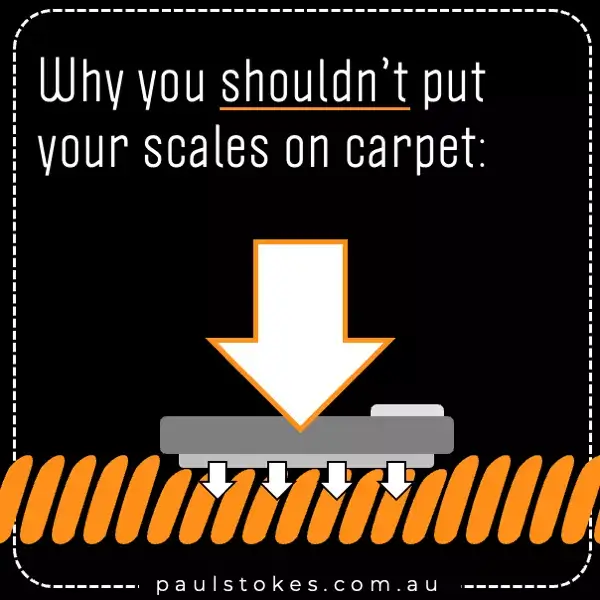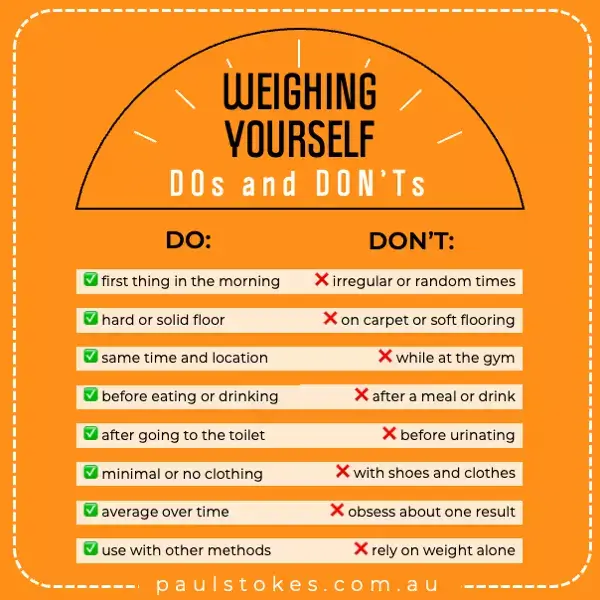Knowing how to weigh yourself properly can bring many advantages to your health and fitness programming. Most people just jump on the scales and, more often than not, become upset or disappointed with what they show. Here's how you should be doing it:
More...
Many people find weighing themselves to be stressful, so is it worth the stress?
Maybe, maybe not.
Ultimately, jumping on the scales lets you know specifically your relationship with earth's gravity. After all, that's all 'weight' is.
That being said, knowing your mass can be useful when taken in conjunction with other health indicators to give you a general idea of your progress. Additionally, it can help guide your programming as to what you should be aiming towards.
There are other ways to measure and assess your progress including;
So it's important to remember the scale is just one tool in your body composition assessment tool kit.
If you're unable to use the tool without problems, it's probably better to rely upon other tools.
Like any tool, there is a right & wrong way to use it. Likewise, you have to know how to interpret the data it provides.
Make sure you're using it the right way.
The Right Way to Weigh Yourself
Aim to weigh yourself first thing in the morning
Generally speaking, this is when your body is at the 'baseline' level. Similar to when measuring blood pressure, taking your weight as close to waking up as possible is good practice.
For reliable results, taking your measurements at the same time of day allows for more accurate comparisons. Getting into the habit of weighing yourself after getting out of bed will help you gain more useful readings.
Place your scales on a hard or solid floor surface
Wait, interior design matters now too?!
Actually, it does.
Essentially, scales work by measuring how much they compress when you step onto them. That gives you a reading based on how much you weigh. That is, someone weighing heavier will compress the scales more than someone who is lighter.
Makes sense, right?
However, when scales are placed on carpet, a rug, or other soft floor covering, problems occur. You see, that soft floor covering also compresses when weight is applied. As a result, the scales aren't measuring their full compression, since there is some give in the floor surface.

Carpet compresses when weight is applied, so you won't get an accurate reading from your scales
Ideally, you want to place your weighing scales on a hard floor, like wood, tiles or concrete. That way, there is no give when they compress and you'll get a full and accurate reading when it comes time to weigh yourself.
Compare readings only from the same set of scales, at the same location
I'm sure you've experienced this before. Your own set of scales at home tell you one thing... the set at the gym say another. And don't even think about trying the set at the airport!
To account for natural variation between equipment, we want to make sure we only take readings from the same machine each time.
Weigh yourself before eating or drinking anything
You might not think it makes much difference, but it really does!
That glass of water you just drunk - that's 250g (a little over half a pound). That bowl of Weet-bix you had for your breakfast? That'll be 0.36kg (almost 13oz).
Did you really put on 0.2kg since yesterday, or did you just quench your thirst?
Always weigh yourself after going to the toilet
What goes in, must come out. So we want to eliminate any extra weight we might be carrying that interferes with our measurements. Empty your bladder and weigh yourself after a bowel movement if possible.
To weigh yourself correctly, you should be wearing little to no clothing
This isn't always practical, but at the very least, take off your shoes.
Ideally, undress down to your underwear (in the privacy of your own bathroom of course) and then step on the scales.
Weighing yourself naked is even better. Plus it can have other benefits.
Look for trends and average your readings over a time period
Some people like to measure their weight daily. If this is the case, look at your average for the week and base your progress on that. Don't look at the day-to-day fluctuations - you'll drive yourself mad!
Personally, I prefer clients to measure themselves just once per week. Again, on the same day of the week and at the same time of day. We'll then look at trends over a span of a few weeks or a month to see how progress is going.
Remember, body weight is only part of the story
When you weigh yourself, that only gives one piece of information regarding your health and fitness levels. We want to use a range of methods and tools to gain a much clearer understanding of what's happening.

The Problem with Weighing Yourself and Tracking Scale Weight
Your scale weight can fluctuate a lot on a day to day basis, it's important therefore to consider the following variables that can impact scale weight:
Do bear these in mind when looking over your scale weight readings.
The scales only measure your body weight at that particular time.
The scales are only one tool in your body composition assessment kit
They don't judge you or tell you your self-worth. Likewise, they can't determine whether it's been a good or bad day.
It's just objective data for you. It isn't a bad thing to measure or collect, it can really help many people in reaching their goals.
The key is understanding how to use it along with other assessment methods available.
Frequently Asked Questions on How to Weigh Yourself Correctly
Are you supposed to weigh yourself with clothes on?
No. Ideally, you should be in minimal clothing - underwear or naked. At the very least, take off your shoes.
Should you weigh yourself in the morning?
That's generally the best time of day, as your stomach will be empty.
Are you supposed to weigh yourself every day?
It depends. A lot of people like to measure their weight on a daily basis. If you choose to go that route though, I'd suggest looking at your average weight over the course of the week. That way, you'll get a clearer picture of what's happening with your body. As mentioned above, a lot of factors influence how much you weigh.
It can become very difficult to accurately compare one day's readings with the next. Weight differences one day to the next are unlikely the result of increased/decreased body fat.
Why shouldn't I weigh myself on carpet?
Carpet and other soft floor coverings compress when weight is applied. This interferes with the way scales measure your weight. You want your weighing scales on a solid, hard surface like a tiled floor. That way, your scales won't sink in when you step on them and you'll get a more accurate weight reading.
Do you weigh yourself before or after a workout?
Generally, it'd be better to weigh yourself before exercising. That way, you won't have to take into account any physiological changes or sweat loss from your workout. That being said, sometimes it's useful to weigh yourself both before and after your workout so that you can calculate your sweat rate.
Can you weigh yourself after eating?
You shouldn't. The weight of the food you've just consumed will become part of your body weight reading. To get accurate weight measurements, we want as little interference and errors from other factors as possible.
What time of day is best to weigh myself?
For most people, first thing in the morning is best. Ideally, you want to weigh yourself before eating or drinking anything but after having been to the toilet.
What scales should I use to weigh myself?
Whether you go analogue or digital usually comes down to personal preference. Good quality bathroom scales are generally fine for most people. Buy the best quality set you can afford. I've had good results with my clients using these: Weight Watchers Bluetooth Bathroom Scales
Should I weigh myself or not?
It really is up to you and what you're looking to achieve. If knowing your weight serves a purpose in your health & fitness goals, then you should weigh yourself.
That being said, it's important to note that weight alone isn't much use. Ideally, you'd want to use a range of methods when tracking your progress to get a clear and accurate picture of what's happening.
Is it best to weigh yourself daily or weekly?
Personally, I prefer my clients to measure themselves weekly. On the same day and at the same time of day each week.
Weighing yourself too often, like every day, can lead to confusion and frustration. Your weight naturally fluctuates on a day-to-day basis so it's easy to become disheartened.
Body fat takes time to lose (and gain) so changes in weight from one day to the next are rarely due to just body fat levels.
Should I weigh myself before or after I go to the toilet?
After.
For consistency, and to be able to compare results and readings from one measurement to the next, we want to keep things as controlled as possible. That means, where possible, having an empty bladder and weighing ourselves after a bowel movement.
It's impossible to know how much urine we have in our system, or how much the contents of our digestive system weigh. Therefore, it's best to eliminate these so they can't interfere with our measurements.
Is it important to weigh yourself?
It can be, but not for everyone. If you have a body composition goal or are looking to track or make changes to your nutrition, then you should know your weight. It's a basic measure of one aspect of the human body.
That being said, there are lots of measurements we can take. It's only important to weigh yourself if how much you weigh is important.
